- Home
- Fay Weldon
Down Among the Women Page 14
Down Among the Women Read online
Page 14
Jocelyn leads her friend to the spare bedroom and helps her into bed, for Helen is trembling violently.
‘Shall I call a doctor?’ she asks.
‘Ring X,’ says Helen. Jocelyn is horrified.
‘What, me??
‘Ring X at the studio and tell him he can get hold of me here.’
‘But supposing he doesn’t want to?’
‘Don’t be so stupid,’ says Helen. ‘Of course he does.’
Jocelyn telephones. To her relief there is no reply.
‘You see,’ says Helen. ‘He is walking the streets, looking for me.’
‘Shall I try his house?’ asks Jocelyn, fearfully.
‘He won’t be there,’ says Helen, with total conviction, and falls asleep. Jocelyn goes back to bed.
Helen is wrong. X is back home in bed with Y, as Helen finds out the next afternoon when she goes back to the studio with Jocelyn and finds her belongings out in the street, and X, silent and craggy, stacking her paintings, slashed and broken, behind the dustbins.
He will not speak to her. Not a word. Y is there, though, and she says quite a lot. Jocelyn tugs and drags at Helen, gets her back into the car, and takes her back home. Jocelyn too is trembling. She had not known educated people could speak to each other like that. She goes back later for the paintings, but the dustmen have taken them.
Helen lies on the bed in Jocelyn’s spare room, silent and frightening. She will not eat. She spends her twenty-sixth birthday staring at the ceiling.
Jocelyn is bowed down by responsibility. Helen has no parents, no family, no friends. Where does she come from, this mysterious creature? No one has ever been quite sure.
On the second day Philip, who is flattered by having his spare room occupied by someone so exotic, tries to cheer Helen up. He puts on a false moustache and does his imitation of a Jewish miser. Helen turns her face to the wall but sheer astonishment seems to work some healing in her, for on the third day she speaks.
‘How like your dog your husband is,’ she says to Jocelyn, who is dusting round the ornaments. Jocelyn wears rubber gloves for the dusting, feeling she has to choose between the ornaments and her hands. Many is the nice piece of glass, the pretty piece of china she smashes. But what else can she do? She doesn’t trust the cleaning woman Elise, though Elise—who is a middle-aged mid-European refugee fallen on hard times—looks in the dustbins at the wreckage and marvels; she who has seen so much broken in her life that she now treasures and cherishes the smallest thing.
‘What do you mean?’ asks Jocelyn, surprised. ‘Like a dog?’
‘Oh, never mind,’ says Helen, and closes her eyes and appears to go to sleep, until the crash of Jocelyn tripping over the lead of the vacuum cleaner prompts her to speak again.
‘We all have our own ways of surviving,’ she remarks. And she talks of her past, while Jocelyn puts the electric plug back on to the lead. Her parents were Berliners, communists. They sent her out of Germany to a British family just before the war, and that was the last she saw or heard of them. The family—rich Hampstead communists—sent her to Australia, and then were themselves wiped out by a flying bomb. At seventeen, she married. At eighteen she divorced her husband, who was a schizophrenic. Helen relates the tale calmly.
‘I never knew,’ says Jocelyn. ‘What a terrible place the world can be! I have so much to be thankful for.’
She puts the plug into its socket and turns on the switch. There is an explosion and all the power in the house goes off, though Jocelyn does not realize this until the evening when she tries to put the lights on. Philip roars and bangs through the house in rage, and Jocelyn, going into the darkness of Helen’s room, hears what at first she thinks is sobbing, and then realizes is laughing. Helen does not often cry.
On the fourth day Helen talks about X.
‘He is a man without a name,’ she says. ‘He is any man, he is interchangeable with other men. All men are the same. So, he can paint. So, because he is a great painter does not mean he is a great man. It was his painting I loved, not him. As for Y, she is meaningless. I thought she was gentle and kind, as I remember my mother, but she was hard and cruel and violent to me.’
All the same, she cries a little. Jocelyn has never seen Helen cry. She is awed.
‘They were my family,’ says Helen, eyes enormous and swimming. ‘Y had no right to be so unkind to me. I never meant to harm her. I loved her. I only took from her what was left over. She didn’t need it. Why did she grudge me such a little part of him?’
She sits up in bed. She combs her hair. She looks at her face in the mirror.
‘I am beautiful,’ she says. ‘I am talented. Y is nothing, nothing. That is the whole trouble. A man can only be happy with his inferior.’
‘What a strange thing to say,’ says Jocelyn.
‘It is perfectly true,’ says Helen. ‘That is why Philip will never be happy with you.’
Jocelyn leaves the room.
On the fifth day Helen gets out of bed and stands naked before Jocelyn. Not as the girls at school would stand naked and shivering under the showers, but like some goddess, arms up-stretched towards the heavens, as if they were her natural home.
‘Well,’ says Helen. ‘I am still alive. So, while we wait, let us live.’
Helen goes through Jocelyn’s wardrobe, without enthusiasm, and finally condescends to wear a lambswool sweater and skirt. She wears no bra, which shocks Jocelyn, who is alarmed by the sight of nipples through stretched wool, and disconcerted at the way Philip’s eyes are riveted while they eat dinner. Philip plies Helen with wine. Helen talks of painters and paintings, and scandals in the art world. Jocelyn forgets that she ought to be jealous. Already she cannot bear to think of the world without Helen.
On the sixth day Helen takes Jocelyn shopping. They go to Liberty’s, and Helen feels fabrics with her sensitive fingers, and regards clothes with an eye that seems only to be pleased by what is very expensive, and very precious. Helen adopts a haughty attitude towards material things. It is as if they have to try very hard to please her. Jocelyn, for her part, tends to feel inadequate in the face of objects, as if it was she who failed in the appreciating, not they in the pleasing.
Helen buys clothes, and a real leather trunk to put them in. She spends over seven hundred pounds. Jocelyn does not like to ask where the money comes from. But Helen, on the way home in a taxi, offers the information.
‘I came into some money,’ she says. ‘Reparation money from Germany because of my ruined life.’
‘Is your life ruined?’ asks Jocelyn.
‘Not in the way they think,’ says Helen, ‘but yes, my life is ruined.’ She seems resigned, almost cheerful.
‘Is it a lump sum?’ asks Jocelyn, awed by someone who’s life has been so disturbed that even governments take notice. ‘Not a pension or anything?’
‘A small lump sum,’ says Helen. ‘I spent most of it this morning.’
‘On clothes!’ Jocelyn is shocked.
‘If one has to be poor,’ says Helen, ‘one can at least be poor in style. One must never accept what is second best. Even in degradation, one can choose. The gutter one lies in must be the deepest, dirtiest, freest-flowing gutter of them all. If one eats weevils, let them be curly, plump and strong.’
And she promises to take Jocelyn to Harrods the following day and advise her on new fabrics and furnishings for her living-room. Helen’s presence has made Jocelyn worried lest her home might be tatty, vulgar, and tasteless.
But by the seventh day Helen has gone. Not back to the studio—though she has tried, only to be faced by Y, who has moved in and is now working there with X—but to live with Carl, a man whom Jocelyn never even knew existed. Carl is a rich man, and an art collector—a patron of X’s. His desire to be part of the creative process is so strong that it stretches to include even Helen. Nightly he makes love to her, and feels that this above all is art. Here he roots and plunges, hour after hour, conscious not so much of her, but that here X has gon
e before.
Helen endures, for the sake of the porcelain out of which she sips her morning coffee, and daily brushes him out of her consciousness, like crumbs from the breakfast table.
As for Jocelyn, she recognizes now that everything about her life is second-best, and has been for a long, long time.
Butch has gone to Germany to play rugger. Sylvia, six months pregnant, again—the last child was stillborn—goes to stay with Audrey-Emma and Paul in Suffolk.
The house, crumbling, unpainted, but picturesque, stands alone in a stretch of flat and boring countryside. It is a wet autumn, and to look out of the kitchen window, Sylvia thinks, is as rewarding as holding a wrung-out dishcloth before the eyes. Audrey-Emma and Paul, however, talk about the satisfactions of living next to nature; and about the rhythm of the seasons. ‘The children have a real feel for the country,’ says Paul. They are not allowed to look at television, talk to corrupting estate children, eat white sugar, read comics, or, in theory, say please or thank-you.
They are pale, pretty, withdrawn children (a boy of four and twin girls of three) with pink runny noses and bad chilblains, and clothes which seem for ever caked in mud. Audrey-Emma does not often wash clothes—let alone iron them—but Paul’s family, understandably anxious for his children’s welfare, have for years been sending monthly parcels of old clothes, and Audrey-Emma herself likes to buy at jumble sales, so, though always muddy, the clothes do change from day to day.
When Paul requests her to wipe a nose or sweep a table, or spray the cockroaches, she is too busy—either baking 100% wholewheat stone-ground compost-grown bread or reading Beatrix Potter, aloud—to oblige. She chides her husband for his bourgeois soul. As Paul’s interest in anarchy, old films, Chinese pottery, and health foods wanes, so does Audrey-Emma’s increase.
Paul is kind to Sylvia, who is gentle, female, passive and never answers back. She both lays the table for meals and clears away afterwards, which is something Audrey-Emma never does, although she must get up and down twenty times during each meal, and each time she does so she looks at Paul and sighs, either reproachfully as if to say, ‘Look how hard I have to work and it’s all your fault,’ or, on good days, virtuously, as if to say, ‘Look how sweet and domestic I am being.’
During Sylvia’s stay, deprived of this outlet for her feelings, sitting quietly at the table eating, she feels restless and discontented. She tries to persuade Sylvia to leave Butch.
‘I’m pregnant,’ says Sylvia. ‘How can I?’
‘Women can have babies by themselves,’ says Audrey-Emma. ‘Look at Scarlet, she manages all right. It was only when she was married she had such a hard time. And then again, look at me. I bring my children up single-handed, practically. Paul takes no notice of them at all. I think he is what is called a rejecting father.’
Outside, Paul labours through the mud towards the hen house, tall, pale, and bearded, with a pail of chicken-food in each hand, his three children rolling in the puddles around and behind him, so he has difficulty in walking. There seems total trust between them. Sylvia says nothing.
‘You don’t even know Butch is going to marry you,’ says Audrey-Emma. ‘This has been going on for years.’
‘It’s his divorce,’ says Sylvia. ‘Something is always going wrong. But he won’t leave me. He has to get his gear washed. All that mud every week.’
‘Don’t talk to me of mud,’ says Audrey-Emma, with bitterness. ‘I have it every day.’
‘I thought you liked living in the country,’ says Sylvia.
‘I couldn’t bear to live in a city,’ says Audrey-Emma, automatically. ‘Filthy, sooty, nasty places. Do you know that when Londoners die their lungs are black with embedded soot?’
There is no heating in the house that day. The electricity has been cut off because the bill has not been paid. But there are candles, and rush-lights and an oil stove to cook on. Audrey-Emma cooks four-course meals upon it; dishes up home-grown vegetables, omelettes made of fresh eggs, cottage cheese made from sour milk hung up to drip in stockings in rows in the kitchen; sponge pudding made with heavy brown flour and black strap molasses. A meal will take her three hours to prepare, but nothing puts her off.
‘You’ll just have to wait,’ she says. ‘We can’t let the Electricity Board get the better of us. People have lived without electricity for centuries; so can we, and what’s more we’ll live well.’
Her family sit down at midnight, exhausted and shivering. The children stay up. ‘Families must eat together,’ says Audrey-Emma. ‘That’s what you said, wasn’t it, Paul, when I left my horrid job in London and we came down here? People must be together, totally, within a family. Live together, work together, sleep together. Eat together, even if it is a bit late.’
Audrey-Emma likes to have the children in bed with her and Paul. If he protests, she goes and sleeps with them in their bedroom.
There are bee-hives in the garden, but the swarms succumbed to a disease of some kind last year. Paul says jokingly, ‘Emma ill-wished them.’ Sylvia finds dusty, curled-up bees in corners everywhere. ‘Now Emma has ill-wished the hens,’ he adds.
And indeed the hens, in the previous few weeks, have been hit by illness. Moulting fowls huddle in the unkempt garden. ‘Before that,’ Paul complains, ‘she ill-wished the kiln. It overheated and cracked. I’ve never been able to raise the fifty quid to mend it.’
Emma-Audrey laughs at her husband’s jokes, but breaks crockery in the kitchen after he has made them.
‘He overheated the kiln on purpose,’ she explains to Sylvia eventually. ‘I’d started to do pottery myself, and frankly I was better than him. So of course he had to go and crack the kiln.’
Meanwhile the rain pours down outside, and in through broken tiles inside; the children draw on the walls with chalks and press plasticine into their hair; Paul sits in the study writing poetry; Sylvia chops fresh vegetables on the dining-room table with a patent Victorian vegetable chopper (soon the vegetable water will boil brownish pink from traces of old varnish from the table’s surface); and outside a hundred and seventy-seven hens have not even the energy to seek shelter.
Soon after Sylvia departs, the man from the Ministry of Agriculture turns up. Emma-Audrey prepares to do battle with broken bottles and an air-rifle but Paul, who seems dispirited, and lacks his old ferocity, lets him in, answers questions, and fills up forms.
Emma-Audrey is angry and bewildered.
The Ministry claims the birds have Fowl Pest. Emma-Audrey proves to her satisfaction, by consulting Victorian text-books, that they have an obscure infection which is transmitted by ailing bees, and is curable by dietary control.
The Ministry has the hens destroyed. Emma-Audrey wishes to go to law. Paul will not allow it. Emma-Audrey sulks. So does Paul.
Presently he has talks with his Bank Manager and sets up a battery unit, and produces eggs and chickens by intensive farming methods. He pours penicillin into the mash. The birds, in their tiny cages, have not room to turn around, least of all to peck their neighbours. Their chests are naked, pink and swollen, where they have rubbed against the mesh.
Emma-Audrey weeps for all trapped creatures, sleeps nightly with her grubby, restless children, and starts buying her vegetables canned. She has more housekeeping money these days.
10 SORTING OUT
I WENT TO A PARTY the other night. At midnight, the host escorted a woman guest to her home. By five in the morning he had not returned. The hostess continued with her hostessly duties, smiling politely. What else could she do? She is fifty, intelligent, and nice, but she is fifty. She has been trained to behave well, and not to shout, scream or murder, and that is the only training she has had, besides cookery and housecraft at school. Her husband is rich; if it were not for him she would not be able to give a grand party, and in any case he will be home for breakfast which she will have the privilege of laying on the table before him. So what is she complaining about? What does she expect?
The woman guest needs comforting.
Can one grudge her a simple sexual drunken pleasure? Her husband has just left for Norway on business with his secretary, who has long blonde hair and what her husband describes as laughing eyes. The secretary in her turn needs comforting because her boyfriend has become engaged to a plain fat girl who cooks Apfelstrudel and piles it high with whipped cream, and who came top in housecraft at school. ‘A man needs two women,’ maintains the boyfriend who is all of twenty-two, ‘one to cook and one for bed. I love you but I shall marry her. As life goes on, sex grows less important and dinner more so.’ The secretary, indignant as who would not be, zooms off to Norway in the woman guest’s husband’s Jaguar, for a month’s straightforward affair with the boss, with a little shorthand thrown in. She prefers office work to cooking.
The hostess, fifty and at the end of the line of distress, smiles politely and offers hot soup to departing guests. Soon she will be a grandmother. That seems comforting, down among the women. One wishes marriage for one’s daughters and, for one’s descendants, better luck.
Wanda, Byzantia’s grandmother, feels first relief, and then a spasm of fright when Scarlet leaves Edwin. The period of her reprieve is over. If Scarlet has rejected wifehood, Wanda must presumably resume motherhood. Wanda knows that Scarlet has left home only because Edwin telephones her, and accuses her of a conspiracy which, he maintains, is punishable by law.
‘She is your wife,’ says Wanda, recovering her composure quickly. She does not like to show surprise. ‘She is your responsibility. Nothing to do with me any more.’
‘She is your daughter,’ he retorts. ‘And you’ve been egging her on to this. You’re a man-hater. I hold you responsible. I shall divorce her and sue you for enticement.’
Wanda shrieks with drunken laughter, her hand jovially diving for the crotch of her lorry driver, who is a young out-of-work alcoholic History graduate grateful for a temporary home and someone to buy him drinks.

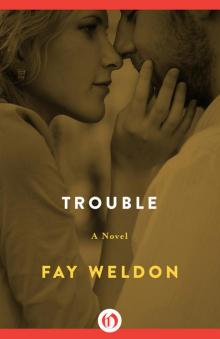 Trouble
Trouble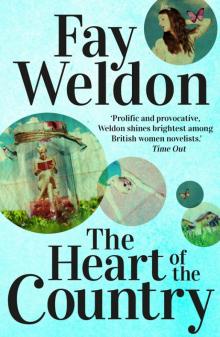 The Heart of the Country
The Heart of the Country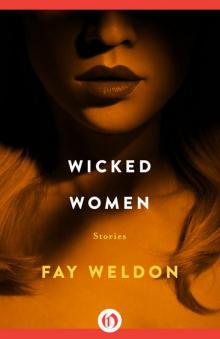 Wicked Women
Wicked Women Mischief
Mischief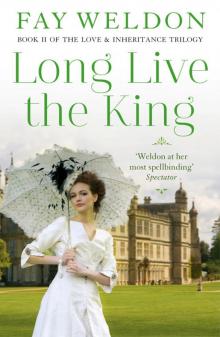 Long Live the King
Long Live the King Remember Me
Remember Me Worst Fears
Worst Fears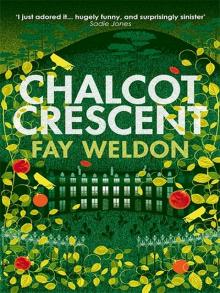 Chalcot Crescent
Chalcot Crescent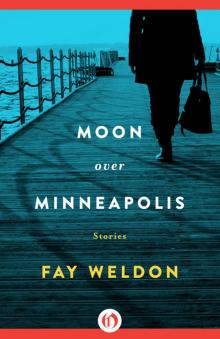 Moon Over Minneapolis
Moon Over Minneapolis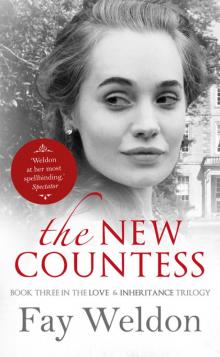 The New Countess
The New Countess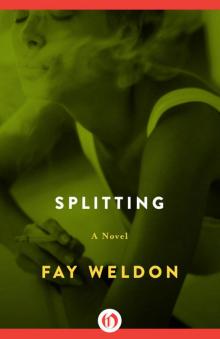 Splitting
Splitting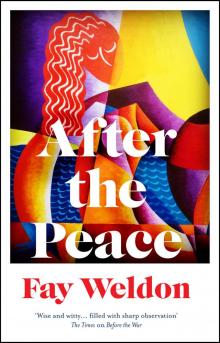 After the Peace
After the Peace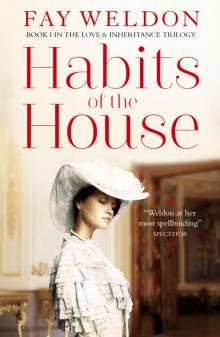 Habits of the House
Habits of the House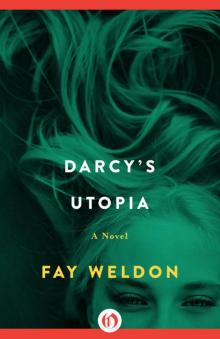 Darcy's Utopia
Darcy's Utopia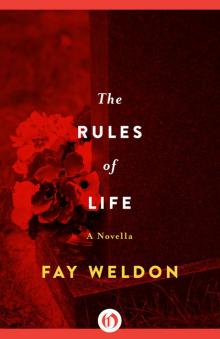 The Rules of Life
The Rules of Life Kehua!
Kehua! Before the War
Before the War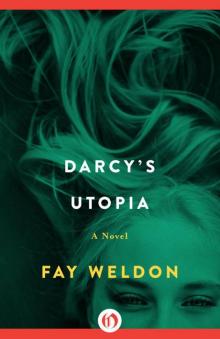 Darcy's Utopia: A Novel
Darcy's Utopia: A Novel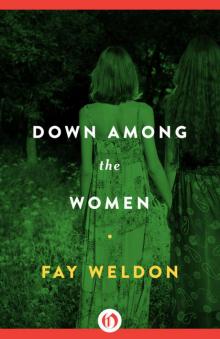 Down Among the Women
Down Among the Women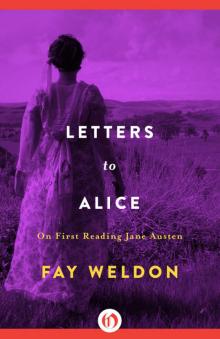 Letters to Alice
Letters to Alice 3 Great Historical Novels
3 Great Historical Novels Female Friends
Female Friends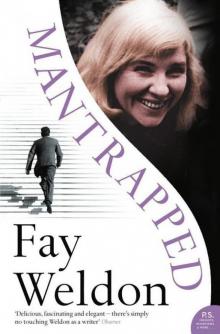 Mantrapped
Mantrapped The Bulgari Connection
The Bulgari Connection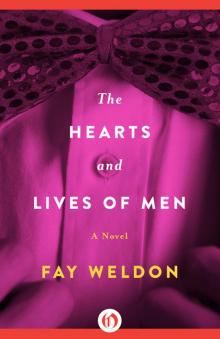 The Hearts and Lives of Men
The Hearts and Lives of Men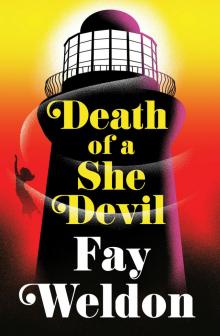 Death of a She Devil
Death of a She Devil